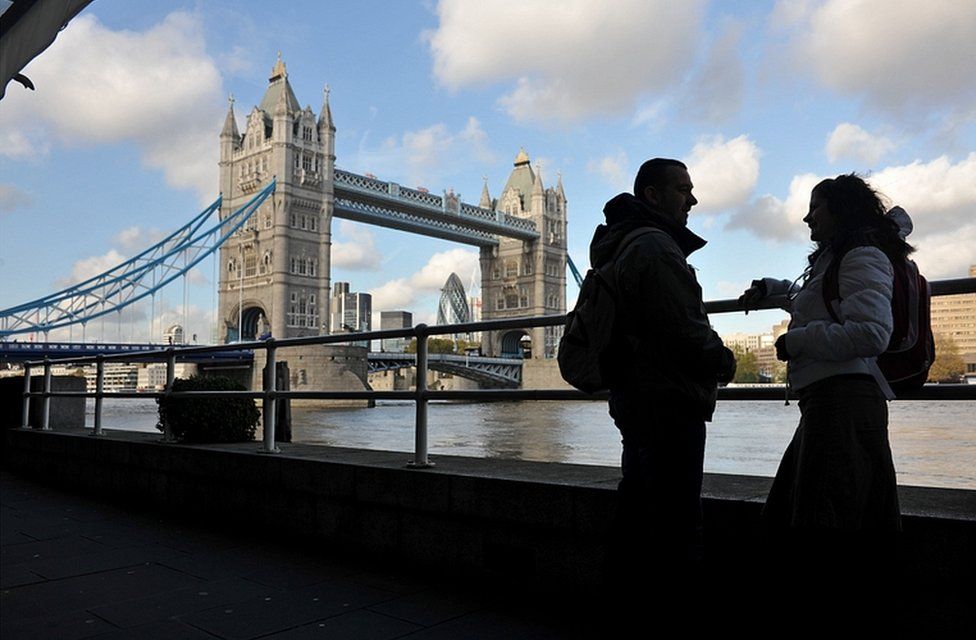Can England become optimistic again?
- Published

The saccharine aroma of reminiscence pervades many an English front parlour. As mantel clocks tick, the faces of England stare regretfully through net curtains, yearning for yesterday.
Nostalgia, the old joke goes, ain't what it used to be. But in England it appears to be making a comeback, with half the country saying things were better in the past.
The large survey commissioned by the BBC to answer "The English Question" suggests that only one person in six believes the country's best years lie ahead, a finding in contrast to the rest of the UK, where a higher proportion of people are optimistic for the future than wish to turn the clock back.
As well as wistfulness for former glories, the English also feel impotent to respond. Seven in 10 people say they feel they have very little or no influence over the decisions that affect their neighbourhood. The sense of powerlessness applies to decisions local and national.
Relating survey findings to local demographics, towns like Great Yarmouth, Hartlepool, Hull and Basildon emerge as places likely to feel particularly disconnected from decision-making. The Brexit battle cry of "taking back control" would have resonated in many similar communities.
The survey results pose important questions about how to bridge the treacherous divide between people and power.
Many in England look enviously at the authority devolved to the other UK nations, complaining that English local government has been emasculated, as central government has become more distant. Only 13% of people think politicians in Westminster reflect their real concerns.
Prioritising England's affairs, even if that threatens the United Kingdom, is a policy supported by a quarter of English residents, according to our survey, a figure that appears to rise to a third in counties like Lincolnshire and towns like Rotherham and Wakefield.
One proposal is that England should have its own parliament, an idea included in the UKIP manifesto at the last election. Roughly four people in 10 support the creation of such a body, rising to half the population in parts of Essex, for example.
But the survey suggests greater enthusiasm for a form of devolution that also enjoys broader political support (even if it draws blank looks from many), introducing combined authorities.
Few dinner tables echo joyously to fevered debate about a new tier of public administration for England, so it is remarkable that, after a brief explanation of their function, our poll finds almost half the population (48%) support having a combined authority in their area.
If one removes those who said they didn't know enough to comment, support rises to three quarters (73%). And the places that are apparently most enthusiastic about combined authorities are the places that already have one.
Greater Manchester pioneered the approach. Ten local town halls joined together to take on powers for their area previously run from Whitehall. As Chancellor, George Osborne gave the new body his blessing and significant new control over health and social care budgets, transport strategy, economic development and more.
It appears that, whatever their politics, many Greater Mancunians support their region taking more control over its destiny. In Stockport, for example, 72% are in favour of having a combined authority, a figure that rises to 87% when you exclude a dwindling number of "don't knows".
There are currently nine combined authorities operating in England outside London, and plans for more. Their secret, it seems to me, is in being created from the ground up rather than designed by some committee of Whitehall bureaucrats who know too little of local allegiances and rivalries.
The prospect of real additional control over the region's development encourages sometimes fractious councils to come together. The arguments are fierce, and sometimes irreconcilable, but the rewards are tangible. Critically, there is flexibility on design - in England one size definitely does not fit all.
Up to now there has been scepticism as to whether the voting public would embrace what some have dismissed as another layer of politicians. Our survey suggests the debate has moved on.
Given a choice as to whether central, local or combined authority government should be in charge of certain services, a combined authority was the most popular for NHS provision, building a new railway and how the police force is run.
Substantial numbers also thought combined authorities should control housing provision, the number of foreign workers an area allows and the level of unemployment benefit applied in a region.
It is still early days for these new bodies and one must be careful not to assume the public has got beyond the swiping right stage. A lot will depend on the performance of the metro mayors who are a government pre-requisite for substantial devolution.
The two mayor Andys - Burnham in Greater Manchester (Labour) and Street in the West Midlands (Conservative) - are vitally important in demonstrating that what is effectively the return of regional government in England works to bridge the democratic deficit.
The clear appetite for greater control probably explains the apparent popularity of these embryonic institutions, but they must patently deliver or risk being mortally wounded by political infighting or strangled by public cynicism.
England feels a discomforted place at the moment, riven over its relationship with the wider world, with its European neighbours and even the other nations in the Union.
Optimism is in short supply and a beguiling nostalgia threatens to turn into resentment or bitterness. Instead of listening to the mantel clock ticking, reminiscing for a lost age, England needs to find a way to reconnect with its citizenry.
- Published5 June 2018
- Published5 June 2018
- Published6 June 2018